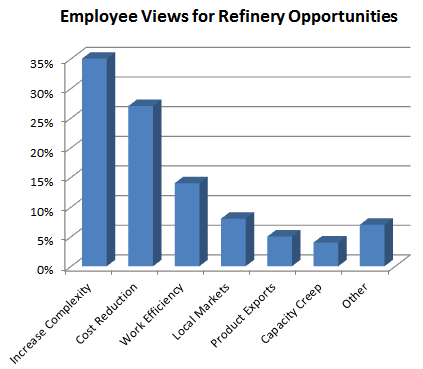RL Blogs

By GTF Staff
Aug 15, 2012Shifts in market trends force Refiners to think differently in defending our profitability. |
||||
|
While a bounce back in oil prices since June has halted the downward trend on the back of the Eurozone crisis, the fact remains that 2011 saw record average prices, with Brent crude averaging US$111.26/bbl.
This has uncomfortable implications for developed markets, as higher energy prices bite into discretionary income and by extension employment growth and the use of fossil fuels for non-essential activities.
With this in mind, it is perhaps no surprise that the take-home message from a survey of employees of refining companies conducted by Global Technology Forum could be summarized as: ‘doing better with less’.
seeing increasing their share of the domestic market as the best opportunities. In addition, of the 30% who said that they were expecting higher CAPEX spending this year, 40% said that the spend would take place in energy efficiency projects, with another 36% singling out projects aimed at increasing complexity.
Both these topics will be explored in detail at the ERTC 17th Annual Meeting, which will feature presentations on the use of preheat antifoulants in crude units to save energy from Dorf Ketal and a case study from Soteica and BP on energy management at the BP Lingen refinery in Germany.
Another mega-trend which will have significant implications for the downstream sector is the shift to natural gas.
With oil majors now expressing their production in barrels of oil equivalent, limited opportunities to grow conventional oil production and the rise of shale gas production in the US, coupled with the massive discount between finished fuels and natural gas on a Btu basis, the scene is set for a slow transition towards a greater role for GTL in meeting transport fuel demand.
This trend appears to be recognized by the downstream sector, with 23% of respondents to the Global Technology Forum survey saying that GTL would be part of a typical refinery in 30 years time, in addition to crude processing.
At the ERTC 17th Annual Meeting, this area will be addressed in a presentation by Technip on the potential synergies from running Fischer-Tropsch and conventional refining processes on the same site.
The full survey results will be available to delegates at the ERTC 17th Annual Meeting, 12 – 14 November 2012, Vienna, Austria. | ||||
|
|










